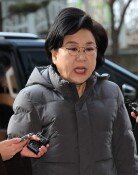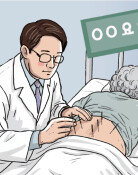Why Korea`s Elderly Keep Working: Self-Esteem
Why Korea`s Elderly Keep Working: Self-Esteem
Posted April. 26, 2008 11:10,
Money is not the reason why Lee Myeong-soon, a street vendor, sells dried octopus and rice cakes in Jongno, Seoul.
She lives with her son, who runs a well-established business and is dutiful to his parents. Lee would not be lacking if she did not work as a street vendor. But, nevertheless, she makes it to Jongno every morning to do her job.
I keep working because I want to show others that the elderly can earn money and have self-esteem without depending on others for their livelihood. I want to show that I can do it too, she says.
As society grows older, social participation by the elderly is more active than ever. The social environment, however, falls far short of being satisfactory for them.
According to a report entitled, An Analysis on the Types of Social Participation by the Elderly in Korea, which was compiled by the Korea Institute for Health and Social Affairs and exclusively obtained by the Dong-A Ilbo, most elderly hope to have a job, not because they need the money but because they want an honorable and independent life.
The institute re-analyzed the information collected through a report entitled, Survey on Old-Aged Living and Demand for Welfare in Korea. This report was carried out in 2004 and surveyed 3,029 people aged 65 and more. It categorized the types of social participation by age.
The largest portion of the group was the nursing home type (1,082 persons, 36%), those who spent most of their time in a nursing home. The religious type (702 persons, 23%) were those who actively participated in religious activities while the working type (546 persons, 18%) were those who worked actively in agricultural or stock-breeding businesses or in sales/service. The volunteer type (398 persons, 13%) were people who actively participated in volunteer activities, and the non-participation type were those who just stayed at home (301 persons, 10%).
According to this analysis, the working type had the most number of men, while the religious type had the most number of women. People in the high household income bracket were found to be more frequently the volunteer type, which included those with an average monthly household income of at least 1.03 million won. Meanwhile, people with lower household income, an average monthly household income of 690,000 won, were found more frequently to be in the nursing home type. The number of elderly educated above a university level was higher in the volunteer type and working type categories, while the number of people with elementary-level education made up a larger proportion of the nursing home type.
The institute also closely interviewed five people in the city, five people in farming and fishing zones, and six people in multifunctional zones.
The survey revealed that there were even more elderly hoping to find a job for the sake of a worthwhile life than for economic reasons. They said that the main reason was that they wanted to discredit the stereotype and negative views that the elderly were incapable.
All the companies I found hiring old people were irregular firms like pyramid schemes, says Kim, 88.
Park, 70, said, I submitted many applications, but companies wouldnt even consider accepting it. Im old but Im capable of doing a guard job if they gave me the chance.
Lee So-jeong, a researcher at the Korea Institute for Health and Social Affairs, says, The fact that so many elderly people go to nursing homes is proof that there is a lack of social infrastructure, which allows them to participate in society. It is an urgent matter to create policies so that more elderly people can contribute to society."
zozo@donga.com







